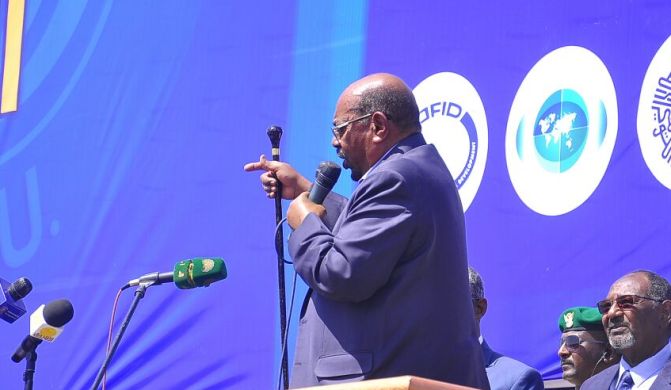Sudan’s “governance structure” to witness fundamental changes: Al-Bashir

April 3, 2017 (KHARTOUM) – Sudanese President Omer al-Bashir Monday said the structure of governance will be changed substantially after the implementation of the dialogue’s outcome, stressing the National Document would constitute the basis for the government of national concord.
Al-Bashir, who addressed the opening session of the parliament Monday, said the “state plan would be subjected to substantive amendments that reflect the outcome of the national dialogue and its impact on the overall economic, political, legal and social conditions, and on the structures and institutions of the state”.
He pointed the National Document would establish peace across the country and enhance the value of dialogue among the various political and social forces besides making equal citizenship the basis for rights and duties and promoting security and defence capabilities to preserve the nation’s sovereignty and strengthen its internal and external security.
Al-Bashir stressed the performance of the state in the coming period would be governed by the public policy document as well as the executive matrix for the implementation of the outcome of the national dialogue.
The Sudanese president added the policies and objectives of the national dialogue would be integrated into the government’s 2017-2020 strategic plan as well as the 2017 national budget.
He renewed the call for the holdout political and armed opposition to listen to the voice of reason and join the national dialogue, saying they would exert every possible effort to convince them to participate in the development of their country.
Al-Bashir said that production represents the biggest challenge to the Sudanese economy, pointing to the growing foreign direct investment flows and the need to develop the economic structure to accommodate these flows.
He stressed the need to improve the standard of living through achieving the economic stability, underscoring the importance to curb inflation and stabilise the exchange rate of the national currency to protect low-income families.
In January 2014, al-Bashir called on political parties and armed groups to engage in a national dialogue to discuss four issues, including ending the civil war, allowing political freedoms, fighting against poverty and revitalising national identity.
The opposition groups boycotted the process because the government didn’t agree to a humanitarian truce with the armed groups and due to its refusal to implement a number of confidence building measures.
In October 2016, the political forces participating in the government-led national dialogue concluded the process by signing the National Document which includes the general features of a future constitution to be finalised by transitional institutions.
(ST)
